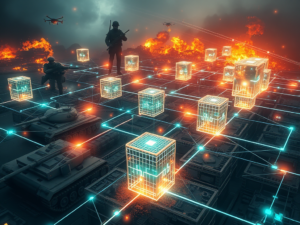Blockchain technology, once confined to the realm of cryptocurrencies, has evolved into a strategic asset in modern warfare. Defense agencies across the globe—including the U.S. Department of Defense, NATO, and China’s PLA—are actively researching and piloting blockchain-based systems to enhance operational security, logistics, and battlefield coordination. According to a 2025 , blockchain’s decentralized architecture offers a tamper-resistant framework for managing sensitive data, enabling secure communication, and automating mission-critical processes through smart contracts. These capabilities are particularly valuable in asymmetric warfare environments, where cyberattacks and misinformation campaigns are as prevalent as kinetic threats.
Cybersecurity and Communication Resilience in Conflict Zones
In the digital theater of war, communication networks are prime targets. Blockchain mitigates this vulnerability by decentralizing data storage and using cryptographic consensus to validate transactions. This eliminates single points of failure and makes it significantly harder for adversaries to intercept or manipulate communications. A 2024 study in JETIR emphasized blockchain’s role in enhancing cyber-resilience by enabling secure identity management, encrypted messaging, and real-time threat intelligence sharing across allied forces. For instance, consortium blockchains can be deployed among NATO members to coordinate cyber defense without exposing sensitive data to centralized servers.
Military Supply Chains: Transparency and Tamper-Proof Logistics
Wartime logistics are notoriously complex and vulnerable to disruption. Blockchain introduces end-to-end traceability in military supply chains, ensuring that every component—from ammunition to aircraft parts—is verifiable and auditable. PwC’s defense report highlighted how blockchain can track the lifecycle of assets like the F-35 fighter jet, which involves over 1,900 suppliers globally. Smart contracts can automate procurement, maintenance scheduling, and inventory updates, reducing human error and fraud. In conflict zones, where supply chain integrity can determine mission success, blockchain offers a resilient backbone for logistics coordination.
Autonomous Systems and Blockchain-Based Command Integrity
The rise of autonomous military systems—such as drones, unmanned ground vehicles, and AI-powered surveillance—demands secure and verifiable command structures. Blockchain can serve as a distributed control layer, ensuring that mission parameters, telemetry data, and control signals are authentic and immutable. A 2020 study in the European Journal of Science and Technology proposed a blockchain-based architecture for UAV communication, which resists spoofing and ensures message integrity even under cyberattack. This is particularly relevant for swarm operations, where multiple autonomous units must coordinate without relying on a vulnerable central node.

Battlefield Intelligence and Data Integrity
Accurate, real-time intelligence is essential for tactical decision-making. Blockchain can be used to timestamp and verify battlefield data—such as drone footage, satellite imagery, and sensor readings—ensuring that commanders operate on trusted information. The U.S. Army’s research into the “Internet of Battlefield Things” (IoBT) includes blockchain as a foundational layer for securing data from edge devices. This approach not only prevents data tampering but also enables secure sharing of intelligence across branches and allied forces, reducing the risk of misinformation and enhancing situational awareness.
Ukraine: A Real-World Case Study in Blockchain-Enabled Warfare
The Russia-Ukraine conflict has become a proving ground for blockchain’s wartime utility. Since 2022, Ukraine has received over $212 million in crypto donations, including $83 million directly to government wallets. These funds were used to procure drones, medical supplies, and protective gear—often bypassing traditional banking systems that were disrupted by war. Ukraine DAO’s NFT auction of a national flag raised $6.75 million, demonstrating how blockchain-based assets can mobilize global support. Moreover, decentralized finance (DeFi) tools and crypto prepaid cards enabled rapid, borderless financial aid to displaced civilians and frontline responders.
Challenges and Ethical Implications of Blockchain in Warfare
Despite its advantages, blockchain’s use in military contexts raises significant concerns. Scalability remains a technical hurdle, especially in high-throughput environments like real-time drone coordination. Interoperability with legacy systems and energy consumption are also critical issues. Ethically, the use of blockchain to coordinate autonomous weapons or surveillance systems prompts questions about accountability and human oversight. As noted in the MDPI review, governance frameworks and international norms will be essential to ensure that blockchain enhances transparency and security without enabling unchecked militarization.





